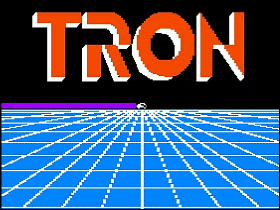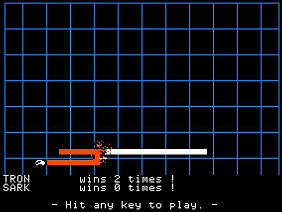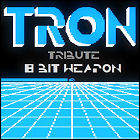 The Game: Up to two players control light cycles that leave a solid light trail in their wake. The object of the game is to trap the other player by surrounding them with a light trail that they can’t avoid crashing into – or forcing them to run into their own trail. Coming into contact with a light trail, either yours or the other player’s, collapses your own trail and ends your turn. The player still standing at the end of the round wins. (“Ivan”, circa 1982)
The Game: Up to two players control light cycles that leave a solid light trail in their wake. The object of the game is to trap the other player by surrounding them with a light trail that they can’t avoid crashing into – or forcing them to run into their own trail. Coming into contact with a light trail, either yours or the other player’s, collapses your own trail and ends your turn. The player still standing at the end of the round wins. (“Ivan”, circa 1982)
Memories: The Apple II software library is as huge as it is because of games like this. It’s a safe bet that “Ivan” didn’t charge for his simple tribute to Tron‘s light cycle scenes; if anyone did charge for it, “Ivan” – whoever he was – probably didn’t see a dime of that. (And even if “Ivan” did try to sell his game, it was probably on such a local basis that Disney never heard of it.) Tron is a homebrew, from an age when nearly every Apple user’s library had at least a few homebrews in it.
The game itself is simple enough – a straightforward, two-player version of the light cycle game – and it isn’t even especially speedy. But consider the fact that, even though it had published Apple II games before, M Network –  the wing of Mattel Electronics that published Mattel games on machines other than the Intellivision – didn’t bother to port any of its Tron games to the Apple. It wasn’t until the Game Boy Advance was on the market that we saw licensed ports of the Tron arcade games. If anyone was going to bring a Tron game to the Apple, it would have to be a fan with some programming chops.
the wing of Mattel Electronics that published Mattel games on machines other than the Intellivision – didn’t bother to port any of its Tron games to the Apple. It wasn’t until the Game Boy Advance was on the market that we saw licensed ports of the Tron arcade games. If anyone was going to bring a Tron game to the Apple, it would have to be a fan with some programming chops.
Tron is also a specimen of something that’s all but gone today: homebrew games on current-generation hardware. Homebrews like Tron were once a mainstay of the computer world. From the “blinky” light cycles to the painfully slow drawing of the O in Tron, this shows all the hallmarks of being a nice, lean BASIC program. Today, the bar to entry is somewhat higher – as are the expectations. The renegades – to say nothing of the old-school ’80s programmers who are used to either working alone or working in very small teams – have migrated to platforms like the iPhone or iPad (though a modern-day “Ivan” couldn’t get away with using the Tron intellectual property without incurring the wrath of Disney at the speed of the internet). And why not, when there’s an infrastructure to help them get their games to the masses so long as they put in a little bit of PR sweat of their own?
Games like Tron are part of what made being a computer user in the ’80s such a blast – the good games didn’t necessarily have to come from the big players like EA and Sierra, and back in those 
 days, you didn’t have to worry about every other program being malware. And if you think that the flipside is that nobody remembers games like these, think again – and look at the cover image from 8 Bit Weapon’s Tron Tribute album.
days, you didn’t have to worry about every other program being malware. And if you think that the flipside is that nobody remembers games like these, think again – and look at the cover image from 8 Bit Weapon’s Tron Tribute album.
Whoever “Ivan” is or was, his influence has probably reached further than even he ever expected.
